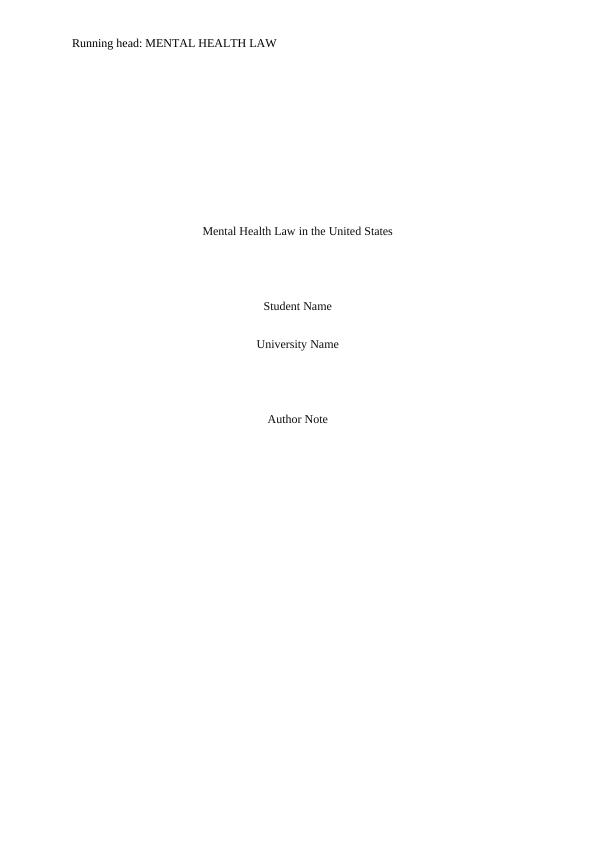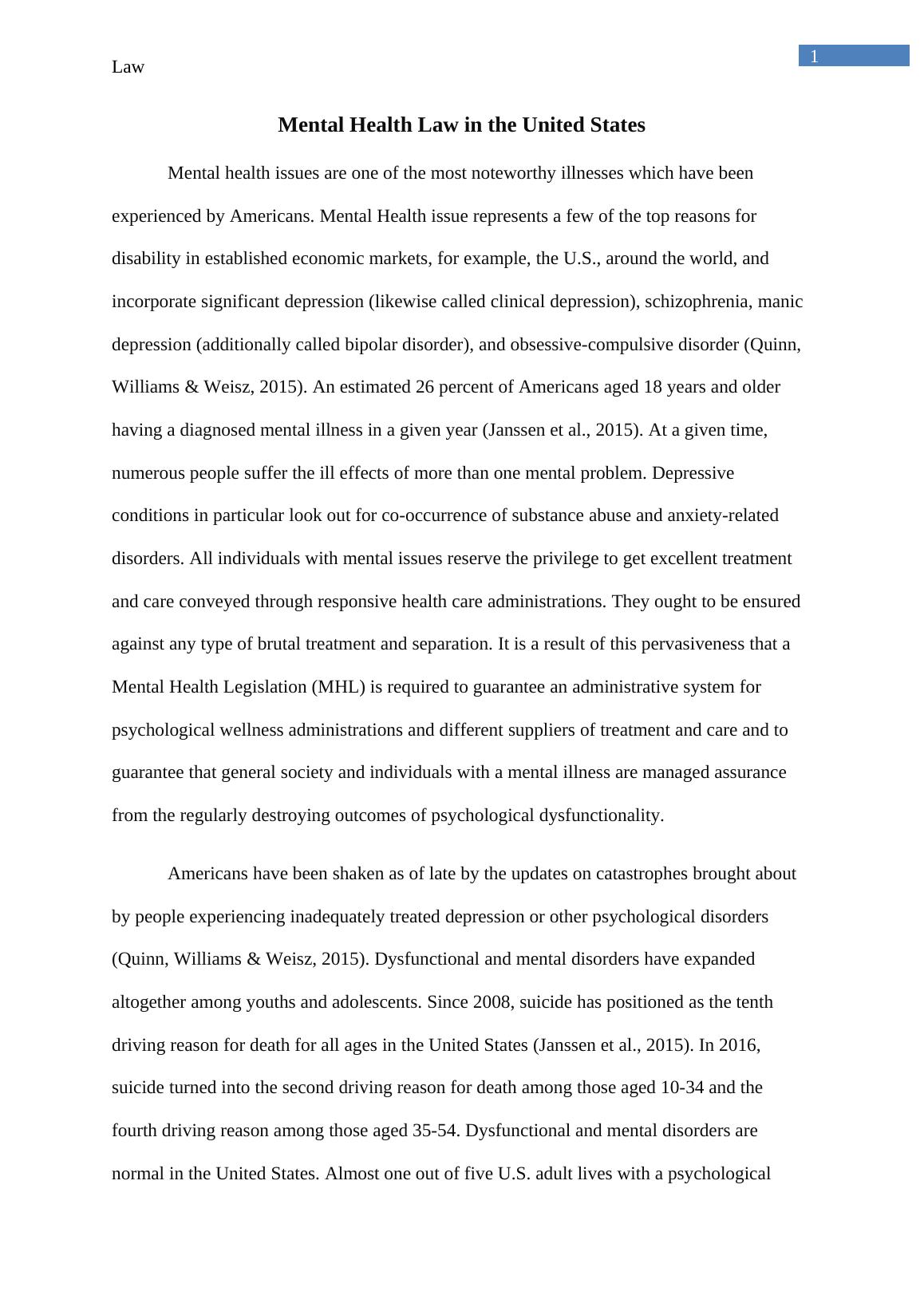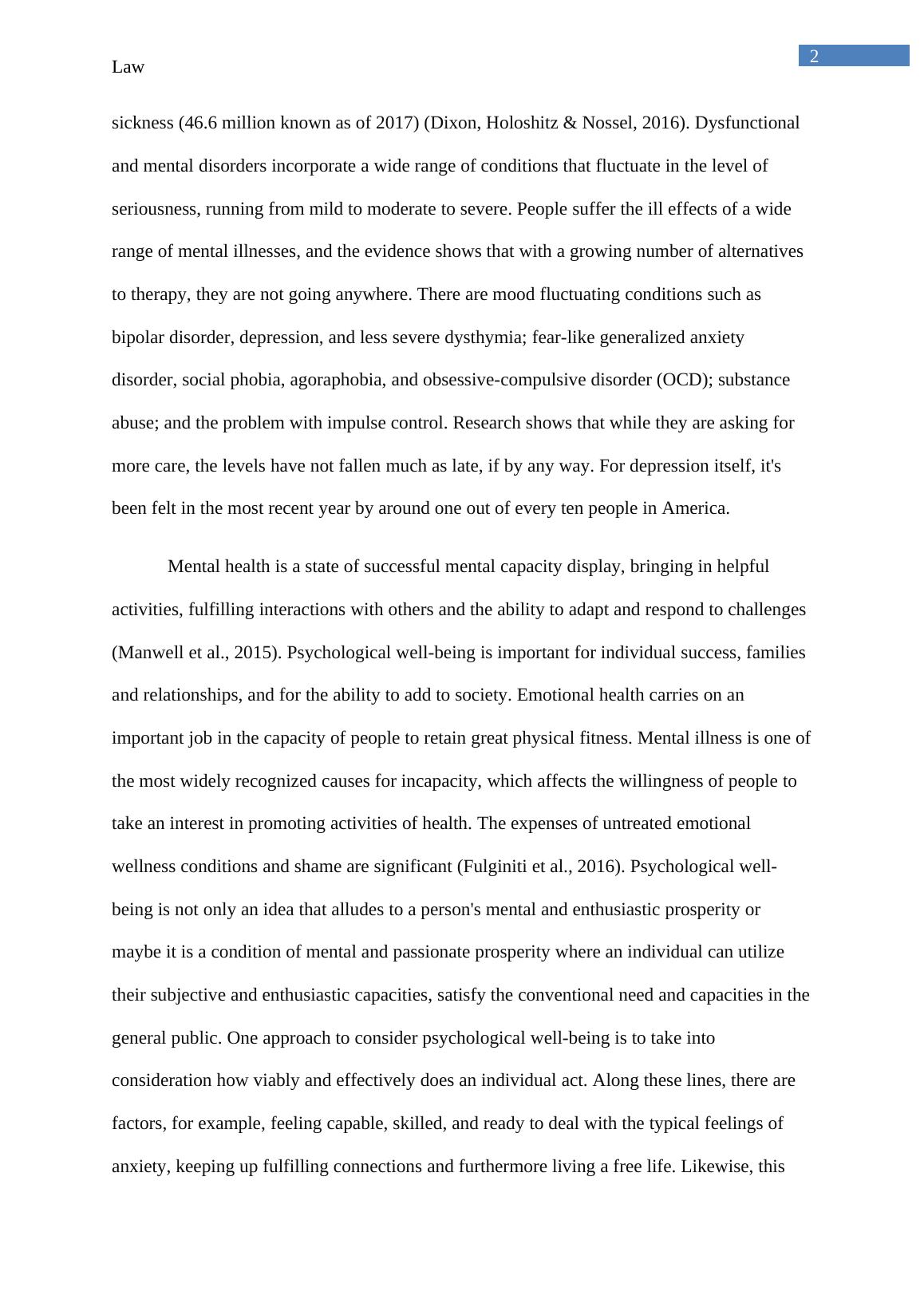Mental Health Law in the United States
Added on 2022-08-12
8 Pages2375 Words38 Views
Running head: MENTAL HEALTH LAW
Mental Health Law in the United States
Student Name
University Name
Author Note
Mental Health Law in the United States
Student Name
University Name
Author Note

1Law
Mental Health Law in the United States
Mental health issues are one of the most noteworthy illnesses which have been
experienced by Americans. Mental Health issue represents a few of the top reasons for
disability in established economic markets, for example, the U.S., around the world, and
incorporate significant depression (likewise called clinical depression), schizophrenia, manic
depression (additionally called bipolar disorder), and obsessive-compulsive disorder (Quinn,
Williams & Weisz, 2015). An estimated 26 percent of Americans aged 18 years and older
having a diagnosed mental illness in a given year (Janssen et al., 2015). At a given time,
numerous people suffer the ill effects of more than one mental problem. Depressive
conditions in particular look out for co-occurrence of substance abuse and anxiety-related
disorders. All individuals with mental issues reserve the privilege to get excellent treatment
and care conveyed through responsive health care administrations. They ought to be ensured
against any type of brutal treatment and separation. It is a result of this pervasiveness that a
Mental Health Legislation (MHL) is required to guarantee an administrative system for
psychological wellness administrations and different suppliers of treatment and care and to
guarantee that general society and individuals with a mental illness are managed assurance
from the regularly destroying outcomes of psychological dysfunctionality.
Americans have been shaken as of late by the updates on catastrophes brought about
by people experiencing inadequately treated depression or other psychological disorders
(Quinn, Williams & Weisz, 2015). Dysfunctional and mental disorders have expanded
altogether among youths and adolescents. Since 2008, suicide has positioned as the tenth
driving reason for death for all ages in the United States (Janssen et al., 2015). In 2016,
suicide turned into the second driving reason for death among those aged 10-34 and the
fourth driving reason among those aged 35-54. Dysfunctional and mental disorders are
normal in the United States. Almost one out of five U.S. adult lives with a psychological
Mental Health Law in the United States
Mental health issues are one of the most noteworthy illnesses which have been
experienced by Americans. Mental Health issue represents a few of the top reasons for
disability in established economic markets, for example, the U.S., around the world, and
incorporate significant depression (likewise called clinical depression), schizophrenia, manic
depression (additionally called bipolar disorder), and obsessive-compulsive disorder (Quinn,
Williams & Weisz, 2015). An estimated 26 percent of Americans aged 18 years and older
having a diagnosed mental illness in a given year (Janssen et al., 2015). At a given time,
numerous people suffer the ill effects of more than one mental problem. Depressive
conditions in particular look out for co-occurrence of substance abuse and anxiety-related
disorders. All individuals with mental issues reserve the privilege to get excellent treatment
and care conveyed through responsive health care administrations. They ought to be ensured
against any type of brutal treatment and separation. It is a result of this pervasiveness that a
Mental Health Legislation (MHL) is required to guarantee an administrative system for
psychological wellness administrations and different suppliers of treatment and care and to
guarantee that general society and individuals with a mental illness are managed assurance
from the regularly destroying outcomes of psychological dysfunctionality.
Americans have been shaken as of late by the updates on catastrophes brought about
by people experiencing inadequately treated depression or other psychological disorders
(Quinn, Williams & Weisz, 2015). Dysfunctional and mental disorders have expanded
altogether among youths and adolescents. Since 2008, suicide has positioned as the tenth
driving reason for death for all ages in the United States (Janssen et al., 2015). In 2016,
suicide turned into the second driving reason for death among those aged 10-34 and the
fourth driving reason among those aged 35-54. Dysfunctional and mental disorders are
normal in the United States. Almost one out of five U.S. adult lives with a psychological

2Law
sickness (46.6 million known as of 2017) (Dixon, Holoshitz & Nossel, 2016). Dysfunctional
and mental disorders incorporate a wide range of conditions that fluctuate in the level of
seriousness, running from mild to moderate to severe. People suffer the ill effects of a wide
range of mental illnesses, and the evidence shows that with a growing number of alternatives
to therapy, they are not going anywhere. There are mood fluctuating conditions such as
bipolar disorder, depression, and less severe dysthymia; fear-like generalized anxiety
disorder, social phobia, agoraphobia, and obsessive-compulsive disorder (OCD); substance
abuse; and the problem with impulse control. Research shows that while they are asking for
more care, the levels have not fallen much as late, if by any way. For depression itself, it's
been felt in the most recent year by around one out of every ten people in America.
Mental health is a state of successful mental capacity display, bringing in helpful
activities, fulfilling interactions with others and the ability to adapt and respond to challenges
(Manwell et al., 2015). Psychological well-being is important for individual success, families
and relationships, and for the ability to add to society. Emotional health carries on an
important job in the capacity of people to retain great physical fitness. Mental illness is one of
the most widely recognized causes for incapacity, which affects the willingness of people to
take an interest in promoting activities of health. The expenses of untreated emotional
wellness conditions and shame are significant (Fulginiti et al., 2016). Psychological well-
being is not only an idea that alludes to a person's mental and enthusiastic prosperity or
maybe it is a condition of mental and passionate prosperity where an individual can utilize
their subjective and enthusiastic capacities, satisfy the conventional need and capacities in the
general public. One approach to consider psychological well-being is to take into
consideration how viably and effectively does an individual act. Along these lines, there are
factors, for example, feeling capable, skilled, and ready to deal with the typical feelings of
anxiety, keeping up fulfilling connections and furthermore living a free life. Likewise, this
sickness (46.6 million known as of 2017) (Dixon, Holoshitz & Nossel, 2016). Dysfunctional
and mental disorders incorporate a wide range of conditions that fluctuate in the level of
seriousness, running from mild to moderate to severe. People suffer the ill effects of a wide
range of mental illnesses, and the evidence shows that with a growing number of alternatives
to therapy, they are not going anywhere. There are mood fluctuating conditions such as
bipolar disorder, depression, and less severe dysthymia; fear-like generalized anxiety
disorder, social phobia, agoraphobia, and obsessive-compulsive disorder (OCD); substance
abuse; and the problem with impulse control. Research shows that while they are asking for
more care, the levels have not fallen much as late, if by any way. For depression itself, it's
been felt in the most recent year by around one out of every ten people in America.
Mental health is a state of successful mental capacity display, bringing in helpful
activities, fulfilling interactions with others and the ability to adapt and respond to challenges
(Manwell et al., 2015). Psychological well-being is important for individual success, families
and relationships, and for the ability to add to society. Emotional health carries on an
important job in the capacity of people to retain great physical fitness. Mental illness is one of
the most widely recognized causes for incapacity, which affects the willingness of people to
take an interest in promoting activities of health. The expenses of untreated emotional
wellness conditions and shame are significant (Fulginiti et al., 2016). Psychological well-
being is not only an idea that alludes to a person's mental and enthusiastic prosperity or
maybe it is a condition of mental and passionate prosperity where an individual can utilize
their subjective and enthusiastic capacities, satisfy the conventional need and capacities in the
general public. One approach to consider psychological well-being is to take into
consideration how viably and effectively does an individual act. Along these lines, there are
factors, for example, feeling capable, skilled, and ready to deal with the typical feelings of
anxiety, keeping up fulfilling connections and furthermore living a free life. Likewise, this

End of preview
Want to access all the pages? Upload your documents or become a member.
Related Documents
The Assignment on Social Determinants of Mental Healthlg...
|11
|3097
|44
Diagnosing Mental Illness Assignmentlg...
|11
|3231
|456
Psychological Disorders and Treatmentlg...
|8
|1420
|193
Management of Clinical Practices for Mental Health Patients with Depression and Anxietylg...
|26
|8793
|76
Contemporary Issues in Mental Health: A Study of Psychologylg...
|11
|3844
|95
Treatment Options and Nursing Interventions for Mental Health Disorderslg...
|8
|2200
|167
